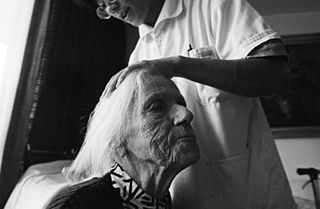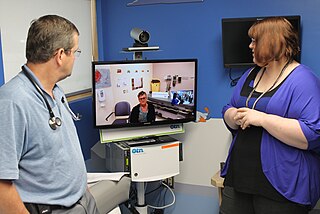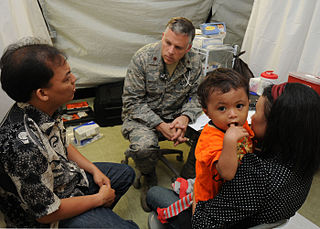
Home care is supportive care provided in the home. Care may be provided by licensed healthcare professionals who provide medical treatment needs or by professional caregivers who provide daily assistance to ensure the activities of daily living (ADLs) are met. In-home medical care is often and more accurately referred to as home health care or formal care. Home health care is different non-medical care, custodial care, or private-duty care which refers to assistance and services provided by persons who are not nurses, doctors, or other licensed medical personnel. For patients recovering from surgery or illness, home care may include rehabilitative therapies. For terminally ill patients, home care may include hospice care.

Health care, or healthcare, is the improvement of health via the prevention, diagnosis, treatment, amelioration or cure of disease, illness, injury, and other physical and mental impairments in people. Health care is delivered by health professionals and allied health fields. Medicine, dentistry, pharmacy, midwifery, nursing, optometry, audiology, psychology, occupational therapy, physical therapy, athletic training, and other health professions all constitute health care. The term includes work done in providing primary care, secondary care, tertiary care, and public health.

Health economics is a branch of economics concerned with issues related to efficiency, effectiveness, value and behavior in the production and consumption of health and healthcare. Health economics is important in determining how to improve health outcomes and lifestyle patterns through interactions between individuals, healthcare providers and clinical settings. In broad terms, health economists study the functioning of healthcare systems and health-affecting behaviors such as smoking, diabetes, and obesity.

The healthcare industry is an aggregation and integration of sectors within the economic system that provides goods and services to treat patients with curative, preventive, rehabilitative, and palliative care. It encompasses the creation and commercialization of products and services conducive to the preservation and restoration of well-being. The contemporary healthcare sector comprises three fundamental facets, namely services, products, and finance. It can be further subdivided into numerous sectors and categories and relies on interdisciplinary teams of highly skilled professionals and paraprofessionals to address the healthcare requirements of both individuals and communities.

Health informatics combines communications, information technology (IT), and health care to enhance patient care and is at the forefront of the medical technological revolution. It can be viewed as a branch of engineering and applied science.
Health insurance or medical insurance is a type of insurance that covers the whole or a part of the risk of a person incurring medical expenses. As with other types of insurance, risk is shared among many individuals. By estimating the overall risk of health risk and health system expenses over the risk pool, an insurer can develop a routine finance structure, such as a monthly premium or payroll tax, to provide the money to pay for the health care benefits specified in the insurance agreement. The benefit is administered by a central organization, such as a government agency, private business, or not-for-profit entity.

Telenursing refers to the use of information technology in the provision of nursing services whenever physical distance exists between patient and nurse, or between any number of nurses. As a field, it is part of telemedicine, and has many points of contacts with other medical and non-medical applications, such as telediagnosis, teleconsultation, and telemonitoring. The field, however, is still being developed as the information on telenursing isn't comprehensive enough.
A personal health record (PHR) is a health record where health data and other information related to the care of a patient is maintained by the patient. This stands in contrast to the more widely used electronic medical record, which is operated by institutions and contains data entered by clinicians to support insurance claims. The intention of a PHR is to provide a complete and accurate summary of an individual's medical history which is accessible online. The health data on a PHR might include patient-reported outcome data, lab results, and data from devices such as wireless electronic weighing scales or from a smartphone.
Allied health professions (AHPs) are a category of health professionals that provide a range of diagnostic, preventive, therapeutic, and rehabilitative services in connection with health care. While there is no international standard for defining the diversity of allied health professions, they are typically considered those which are distinct from the fields of medicine, nursing and dentistry.
Health information exchange (HIE) is the mobilization of health care information electronically across organizations within a region, community or hospital system. Participants in data exchange are called in the aggregate Health Information Networks (HIN). In practice, the term HIE may also refer to the health information organization (HIO) that facilitates the exchange. The goal of HIE is to facilitate access to and retrieval of clinical data to provide to public health authorities in analyses of the health of the population.

The American Health Care Association (AHCA) is a non-profit federation of affiliated state health organizations that represents more than 14,000 non-profit and for-profit nursing homes, assisted living communities, and facilities for individuals with disabilities. Clifton J. Porter, II became CEO on 14 October 2024.
Transitional care refers to the coordination and continuity of health care during a movement from one healthcare setting to either another or to home, called care transition, between health care practitioners and settings as their condition and care needs change during the course of a chronic or acute illness. Older adults who suffer from a variety of health conditions often need health care services in different settings to meet their many needs. For young people the focus is on moving successfully from child to adult health services.

The philosophy of healthcare is the study of the ethics, processes, and people which constitute the maintenance of health for human beings. For the most part, however, the philosophy of healthcare is best approached as an indelible component of human social structures. That is, the societal institution of healthcare can be seen as a necessary phenomenon of human civilization whereby an individual continually seeks to improve, mend, and alter the overall nature and quality of their life. This perennial concern is especially prominent in modern political liberalism, wherein health has been understood as the foundational good necessary for public life.
Outcomes research is a branch of public health research which studies the end results of the structure and processes of the health care system on the health and well-being of patients and populations. According to one medical outcomes and guidelines source book - 1996, Outcomes research includes health services research that focuses on identifying variations in medical procedures and associated health outcomes. Though listed as a synonym for the National Library of Medicine MeSH term "Outcome Assessment ", outcomes research may refer to both health services research and healthcare outcomes assessment, which aims at health technology assessment, decision making, and policy analysis through systematic evaluation of quality of care, access, and effectiveness.
The Health Industry Business Communications Council (HIBCC) is a primary standard-setting and educational organization for healthcare bar coding in the United States. It provides publications, trade shows, educational resources, conferences and training programs.

Belgium has a universal healthcare system, which is composed of three parts: first, there is a primarily publicly funded health care and social security service run by the federal government, which organises and regulates healthcare; independent private/public practitioners, university/semi-private hospitals and care institutions. There are a few private hospitals. Secondly is the insurance coverage provided for patients. Finally, industry coverage, which covers the production and distribution of healthcare products for research and development. The primary aspect of this research is done in universities and hospitals.

Sky Lakes Medical Center is a 176-bed hospital located in Klamath Falls, Oregon, United States. Sky Lakes is also a teaching hospital affiliated with Oregon Health & Science University Medical School through the Cascades East Rural Family Medicine Residency Program. It is a community-owned medical center that serves the healthcare needs of an area of approximately 10,000 square miles (26,000 km2) in Oregon and northern California. The hospital was founded in 1965 and incorporated in 1968.

Cultural competence in healthcare refers to the ability for healthcare professionals to demonstrate cultural competence toward patients with diverse values, beliefs, and feelings. This process includes consideration of the individual social, cultural, and psychological needs of patients for effective cross-cultural communication with their health care providers. The goal of cultural competence in health care is to reduce health disparities and to provide optimal care to patients regardless of their race, gender, ethnic background, native languages spoken, and religious or cultural beliefs. Cultural competency training is important in health care fields where human interaction is common, including medicine, nursing, allied health, mental health, social work, pharmacy, oral health, and public health fields.
Health care analytics is the health care analysis activities that can be undertaken as a result of data collected from four areas within healthcare: (1) claims and cost data, (2) pharmaceutical and research and development (R&D) data, (3) clinical data, and (4) patient behaviors and preferences data. Health care analytics is a growing industry in many countries including the United States, where it is expected to grow to more than $31 billion by 2022. It is also increasingly important to governments and public health agencies to support health policy and meet public expectations for transparency, as accelerated by the Covid-19 pandemic.
In its succinct definition, healthcare engineering is "engineering involved in all aspects of healthcare". The term engineering in this definition covers all engineering disciplines such as biomedical, chemical, civil, computer, electrical, environmental, hospital architecture, industrial, information, materials, mechanical, software, and systems engineering.











